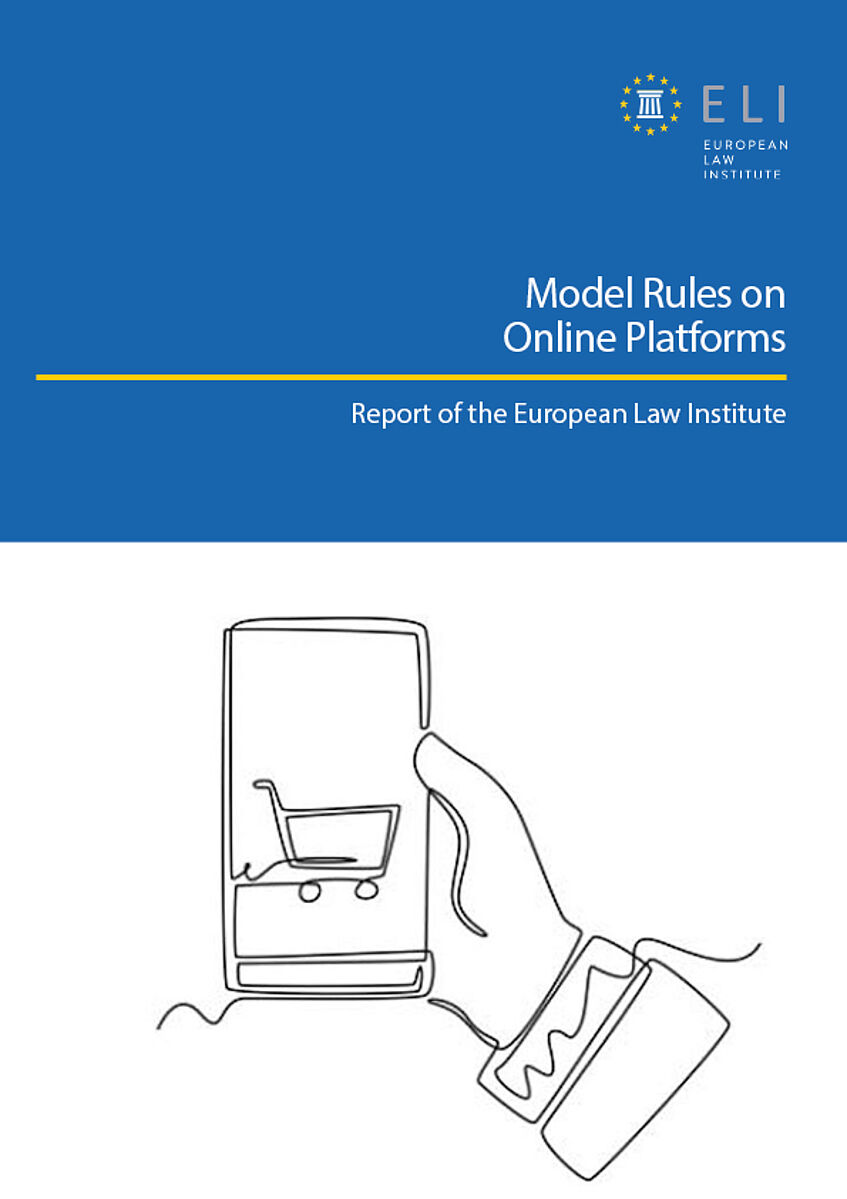ELI Model Rules on Online Platforms
Quick Facts
Project Type: Model Rules
Procedure: Regular
Adopted: CD 2016/6 (on Projects)
Project Period: January 2017–December 2019
Events and Meetings
An overview of past and upcoming events of this project is available here.
Translations
The following version is available: Japanese.
Citations
A selection of citations about the project is available here.
Summary
The project aimed to develop model rules on online platforms that set out a balance between conflicting policy options, and demonstrate what potential regulation at EU or national level could look like.
Background
The digital economy is increasingly shaped by online platforms serving as marketplaces where customers can buy goods or book services (eg Airbnb, Uber, Amazon). Their dynamics can be difficult to reconcile with the currently existing regulatory framework at EU level.
The rise of online platforms is one of the fundamental economic and societal developments of recent years. The rapid growth of the ‘platform economy’ has triggered a debate over whether the regulatory framework has to be adjusted in order to adequately reflect the changing market structure. In particular, the recalibration of rights and duties in the triangle between suppliers, customers and platform operators is currently being discussed. Recently, the first steps towards a regulatory framework for the platform economy have been taken at European and national level. However, regulation remains fragmented and sometimes inconsistent.
Aim and Outcome
The ELI Project Team has drawn up a set of Model Rules that is meant as a contribution to the ongoing debate and provides a ‘visualisation’ of how a balanced approach could look, if regulatory action is considered necessary. It goes without saying that the ELI Model Rules cannot address all possible legal aspects of the platform economy. More precisely, these rules only deal with one core aspect of online platforms: the relationship between platform operators and platform users. What are the duties of platform operators towards platform users? In which cases may operators be liable towards users? What are the minimum requirements regarding fairness and the transparency of platforms? How should reputation systems for the collection of customer reviews be designed? Should there be a right to the portability of ‘reputational capital’?
With regard to these questions, the ELI Model Rules not only aim to consolidate existing European and national legislation, but also provide some innovative solutions for issues that could be addressed in forthcoming regulatory initiatives, in particular platform liability and reputation systems. These rules draw inspiration from European and national legislation, recent case law as well as other regulatory instruments such as international standards.
The ELI Model Rules are based on the premise that the existing rules of competition law are necessary, but not sufficient for ensuring fairness in the digital economy. These rules, which are applicable independently of any threshold regarding market power, are meant to complement antitrust rules. From this perspective, the ELI Model Rules could provide a source of inspiration for European and national legislators or industry self-regulation.
Project Reporters
- Christoph Busch
- Gerhard Dannemann
- Hans Schulte-Nölke
- Aneta Wiewiorowska-Domagalska
- Fryderyk Zoll
Other Project Team Members
- Fabrizio Cafaggi
- Carolin Cauffman
- Alberto De Franceschi
- Agnieszka Jabłonowska
- Monika Jagielska
- Vanessa Mak
- Hans Micklitz
- Jeremias Adams-Prassl
- Teresa Rodriguez de las Heras Ballell
- Juliette Sénéchal
- Marie Jull Sorensen
- Anne de Vries
- Tina de Vries
- Célia Zolynski
Advisory Committee Members
- Luisa Clode
- Bertrand Debosque
- Judita Dolžan
- Marta Infantino (Assessor)
- Byung Jun Lee
- Irene Kull
- Damjan Možina (Assessor)
- Kunihiro Nakata
- Gerald Spindler
- Jos Uitdehaag
- Christiane Wendehorst
- Marilies Zinner
Members Consultative Committee
- Paul Abbiati
- Hans-Jürgenn Ahrens
- Elena Bargelli (Chair)
- Małgorzata Boszko
- Federica Casarosa
- Concetta Causarano
- Kosjenka Dumančić
- EFTA Surveillance Authority
- Wian Erlank
- Michèle Finck
- Marco Giacalone
- Patrícia Guimarães
- Georg Gutfleisch
- Martin Husovec
- Paola Iamiceli
- Liliya Ivanova
- Václav Janeček
- Ana Keglević Steffek
- Lilia Kisseva
- Michael Lehmann
- Renato Mangano
- Felix Maultzsch
- Sophie Moreil
- Pascal Pichonnaz
- Jerzy Pisulinski Pisulinski
- Sara Rodríguez Marín
- Johannes Safron
- Marta Santos Silva
- Renate Schaub
- Hanna Schebesta
- Stéphanie Laulhé Shaelou
- Matthias Storme
- Julia Suderow
- Iannis Symplis
- Yanko Xavier
- Miguel Pestana de Vasconcelos
- Université Catholique de Louvain (UCL) Institut pour la Recherche Interdisciplinaire en Sciences Juridiques (JUR-I)

